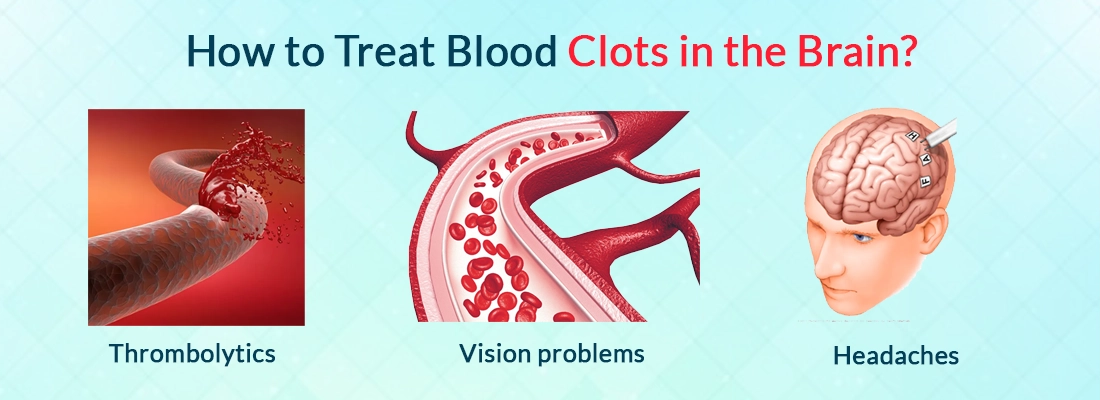
Blood clots are often a rare complication which can be fatal as well. In this blog we will discuss why a blood clot in the brain is formed, its symptoms, the diagnosis and the treatment.
A blood clot to form in your body is usually a normal event as it prevents further haemorrhage. But when a blood clot forms in the blood circulation, it can get clogged in any part of the body and cause complications like decreased blood flow to that part or can even stop the blood flow completely beyond itself. The blood clot to the brain via the blood circulation, it can cause certain complications like seizures, headaches, or can cause even more severe complications including death. If you face symptoms for more than 12 hours, it becomes an emergency case needing immediate care.
Factors That May Cause Blood Clots in Brain
There are many factors that may lead to blood clot formation, some of them are discussed below-
- Obesity or weight gain- uncontrolled weight gain can lead to plaque formation which in turn increases the risk of developing clots
- Age- age can be a risk factor too usually people over 55 years of age have higher risk of developing brain clots.
- Family history- if you have a history of blood clot or brain stroke in your immediate family like parents or grandparents, the chances of you developing brain stroke or blood clots in the brain increases.
- Sedentary lifestyle- if you have an inactive lifestyle, there are chances that you might gain weight which can trigger brain stroke.
- Consumption of alcohol, tobacco or drugs- if you consume alcohol, smoke, or use illegal drugs, you are at high risk of having a brain stroke or developing blood clots in the brain.
- Trauma - head traumas also can cause blood clot formation which may in turn cause decreased or stopped blood supply to the brain and lead to stroke or death.
- Artery resizing- the procedures involving arteries narrowing or broadening can cause blood clot formation.
Symptoms of Blood Clot in the Brain

- Trouble walking- one side of your body might become weak and you might feel trouble in walking due to a blood clot in the brain.
- Vision problems- you might experience blurry vision, darkened vision, loss of balance and dizziness. You might feel like your world is spinning around.
- numbness or tingling- numbness can be felt on one side of the body along with other symptoms. It could be a sign of a stroke that happens due to a blood clot in the brain.
- Slurred speech- a common sign for stroke is often represented as slurred speech. If you are facing difficulty forming words along with numbness on one side of your body, you should consult a doctor.
- Acute paralysis- a blood clot in the brain can also reflect as an acute episode of paralysis. It can also cause stiffness in neck muscles.
- Headaches- headaches can occur in case you have a blood clot in your brain. The headaches can last for more than a day or two. Headaches can occur along with stiff neck. Headaches often can make you feel tired and weak. I can also cause anxiety. If your headache persists for more than a week, it is to be addressed to a doctor immediately since it could be a sign for a brain stroke
Diagnosis of the Blood Clots in Brain
Blood clot diagnosis can be done by combining several tests and examinations
- Physical exam- any swelling or pain in and around the area of injury, symptoms like tingling sensation, fever etc may be a sign for blood clot. Doctors usually look for other symptoms that may present in the blood slot such as stiff neck, or others pertaining to head and neck.
- Blood tests- blood tests can indicate whether you have an active brain bleeding, if it comes out to be positive, you should visit a hospital immediately. Blood tests can also tell if there are other underlying conditions that may cause a blood clot in the brain.
- Imaging tests-
- CT scan- it can provide a detailed view of the brain, which can reveal any bleeding or injury. It can also conclude the symptoms which may be happening due to brain related diseases.
- MRI Scan- MRI scan can also tell about the brain cell damages.
- Angiogram- a cerebral angiography can also give a detailed picture of the brain and its arteries.
- Echocardiography- an echocardiography is a great diagnostic tool which can help detect the cause of a blood clot in the brain. These clots can travel through the blood circulation that may cause a brain stroke.
How to Treat Blood Clots in the Brain?
Doctors use combined approaches to treat blood clots

- Thrombolytics
- Blood thinners
- Brain surgery
- Blood thinners- These are the anticoagulant medication that prevents the blood from process coagulation to slow the blood clot formation. They are used to prevent the already formed blood clot from growing in its size which may otherwise cause permanent damages.
- Brain surgery- Sometimes, in critical stages surgery is required to remove the blood clot from the brain.
- Thrombolytics- These work the same as the blood thinners do, but they relax the tissues where they are injected. Unlike anticoagulants, they do not cause swelling after being taken orally.
Conclusion
For you to have a blood clot, the chances remain low. But with a lifestyle alteration the chances can become greater. By changing simple habits, one can prevent the risk of developing serious complications like a stroke. If you face any of the symptoms related to a brain blood clot formation, you should reach out to your doctor to help eliminate the doubt. Book your appointment today with just one click.
Frequently Asked Questions
What is the best treatment for a blood clot in the brain?
There are several ways to treat blood clots using medications and surgery. The medication based treatment has certain limitations but the surgery is a definitive method.
Can blood clots be cured?
Yes, most of the cases can be successfully treated with medications and a little lifestyle change. Although in certain cases where medications are of not much beneficiary, surgical approach stands in. With early diagnosis, the causes of blood clot can be treated with full recovery.
Can CT Scan detect a blood clot?
Yes, the modified CT procedure known as CT venography and CT pulmonary angiography can precisely and accurately detect the location of blood clot, thereby affirming a blood clot diagnosis.
Can blood clots be removed without surgery?
Yes in certain cases, with medication, the clots can be broken up into smaller pieces. Medicine like TPA- tissue plasminogen activator help break the clot. Other treatments like ischemia and reperfusion therapy can also help to remove clots and reduce further treatment complications. Maintaining an active lifestyle where exercising daily is included can help maintain a good life but care should be taken not to straining yourself.
What are the warning signs of blood clot formation?
Blood clot can represent itself as a swelling, change in colour of the skin, pain, warm skin, trouble breathing, painful and swollen veins, trouble walking, numbness etc.if you feel such signs that remain persistent for more than a week, it is a serious matter, and needs to be addressed to the doctor .
Can a blood clot be confirmed by blood test?
Yes some blood tests can confirm blood clot presence in your body, the D-dimer test can check for blood clotting presence. A higher value of D-dimer test is indicative of the same.
Can high BP cause blood clots in the brain?
High bl;oop pressure can be one of a potential cause leading to clot development. These clots can block a vessel and prevent its functions. A blood clot when clogs into the brain vessels can even lead to death.









